PASSENGER RIGHTS: TRAVELLING IN THE EU WITHOUT ANY WORRIES
Was your train delayed or your flight cancelled? Find out about your passenger rights when travelling in the EU.
Travellers check a board which shows departing flights, many of which are cancelled at Roissy Charles de Gaulle international airport, outside Paris © Europarl.europa.eu
As you set off on your summer holiday, it is good to know that EU passenger rights protect you, should anything go wrong while travelling.
EU rules ensure a minimum level of protection for passengers, irrespective of the mode of transport: flight, train, bus, coach or ship.
One thing could disrupt even the perfect holiday – getting there. Journeys can be tricky – with unexpected delays, cancellations and lost luggage. This is why MEPs helped to introduce EU rules obliging transport companies to provide travellers with meals, accommodation, reimbursement and compensation if something happens.
And transport companies in the EU can no longer charge more for tickets based on nationality and location of the purchase.
EU law also guarantees special attention to passengers with reduced mobility who have the right to free assistance services.
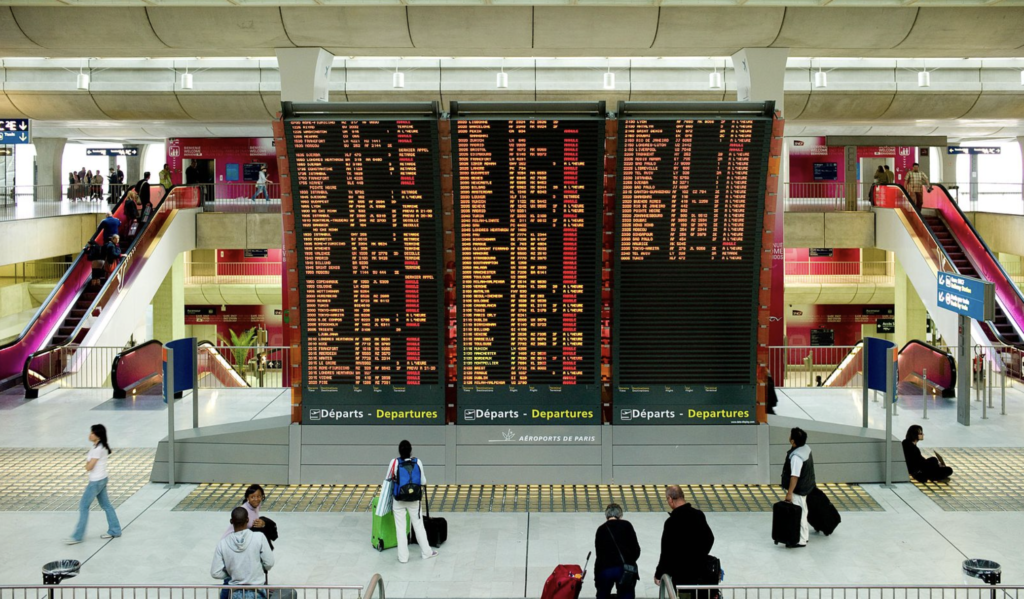
Air passenger rights
Air passenger rights apply under certain circumstances, for example if the flight is within the EU or if it departs from the EU to a non-EU country.
If you are denied boarding, airlines should provide assistance free of charge that can include refreshments, food and accommodation. The airline must also offer you a choice between reimbursement and re-routing. In addition, passengers denied boarding are entitled to up to €600 in compensation. The amount of the compensation depends on the distance of the scheduled flight.
If your flight is cancelled, you have a right to assistance as well as reimbursement, re-routing or return. In the case of delays, this depends on the duration of the delay and the distance of the flight.
Passengers whose flights were cancelled at short notice or arrived more than three hours late may also be entitled to the above-mentioned amounts of compensation, but with some restrictions. It does not apply to companies offering an alternative solution or in extraordinary circumstances, such as air traffic management decisions, political instability, adverse weather conditions or security risks.
Rail passenger rights
EU rules on rail passenger rights apply when you travel by rail within the EU. If your train is cancelled or delayed, the operator must give you information on the situation in real time and provide information on your rights and obligations. Depending on the circumstances, you may be entitled to assistance in the form of meals and refreshments, accommodation and compensation.
Bus passenger rights
Passenger rights mainly apply to regular long-distance bus and coach services that start or finish in an EU country. In case of cancellation or delays, you may be entitled to meals and accommodation.
Ship passenger rights
Rules usually apply to ferries and cruise ships (sea and river) if your journey starts or ends at an EU port. If a crossing was cancelled or departure delayed, you may be entitled to assistance in the form of meals and accommodation. If your arrival is delayed by more than one hour, you are entitled to compensation.
Detailed information on passenger rights for all types of transport is available on the « Your Europe » Website : https://europa.eu/youreurope/citizens/travel/passenger-rights/index_en.htm
TRAFFICKING IN HUMAN BEINGS: EXPERT GROUP GRETA RELEASES ITS ANNUAL REPORT
The Council of Europe’s Group of Experts on Action against Trafficking in Human Beings (GRETA) has published its annual report for 2021. During 2021 GRETA was able to achieve a number of milestones in spite of the negative impact of the Covid-19 pandemic, and continued to develop its cooperation with other Council of Europe bodies, other international organisations and civil society to prevent and combat human trafficking. It carried out ten country evaluation visits and adopted third round evaluation reports on six countries (France, Latvia, Malta, Montenegro, Romania and the United Kingdom). Israel became the second Council of Europe non-member state to accede to the anti-trafficking convention.
In the report, GRETA’s president Helga Gayer stresses that child trafficking has continued to increase despite legislative and policy measures taken by states parties to the anti-trafficking convention. “The Covid-19 pandemic has made children even more vulnerable to trafficking, including exploitation online. All actors involved in action against human trafficking need to step up efforts to combat child trafficking and develop innovative approaches to protect children”, she said. The report contains the key findings and recommendations of a study on online and technology-facilitated trafficking in human beings based on information provided by 40 states parties to the Council of Europe Convention on Action against Trafficking in Human Beings, 12 NGOs and two IT companies.
The study assesses the extent to which technology impacts human trafficking, the operational and legal challenges in detecting, investigating and prosecuting online and ICT-facilitated human trafficking offences, and contains a set of recommendations. The study also explores strategies, tools and good practices adopted by states parties to overcome such challenges. These include Internet monitoring, web-scraping tools and social network analysis. The involvement and co-operation of a wide range of agencies and knowledge sharing are crucial, as is cross-border co-operation in securing electronic evidence.

Technology-based tools to identify victims of trafficking, such as facial recognition and web-crawlers, can be valuable in performing data reduction and handling large volumes of information; however, the study points out that they raise ethical concerns and should only be employed by well-trained operators with knowledge on human trafficking. Online self-reporting mechanisms and helplines enable victims to seek assistance and disseminate information to communities at risk. The study recommends enhancing online confidential reporting mechanisms and working with private companies to set up mechanisms to flag up suspicious activities and advertisements. Countries should also develop data-sharing procedures and co-operation protocols with companies holding relevant data.
“The Covid-19 pandemic and ICT developments have produced structural changes in human traffickers´ modi operandi, which requires countries to adapt and equip their law enforcement agencies and criminal justice systems with capabilities to tackle the changing environment. To counter the use of ICTs by human traffickers, it is essential that governments invest in the training of law enforcement personnel, provide adequate resources and enhance their cooperation with private companies and with other national authorities”, said GRETA’s President Helga Gayer.
The annual report can be downloaded from : https://rm.coe.int/greta-11th-general-report-of-activities-2022-en/1680a72bb8
EUROPE’S FIRST-EVER BEYOND VISUAL LINE OF SIGHT DRONE FLIGHT TAKES OFF IN BELGIUM

Partners in SESAR’s SAFIR-Med project got the green light from the Belgian civil aviation authority to operate a beyond visual line of sight (BVLOS) flight over a populated area between two hospitals in Antwerp. The flight is fully compliant with EASA’s specific operations risk assessment (SORA) and unmanned aircraft system (UAS) regulations.
BVLOS capabilities mean that flights can be flown beyond the visual range, enabling drones to cover far greater distances and opening up the possibility of a wide variety of applications. In the case of the SAFIR-Med project, the focus is on urgent medical deliveries. These are coordinated through a command and control centre system (C2C), which has interfaces with a U-space services provider (USSP).
The flight was given authorisation to take off by the civil aviation authorities who validated the project’s processes and technologies in three areas:
- Combined mitigations to reduce the risk for people on the ground and in the air;
- Risk mitigation based on the SABCA designed X-8 multicopter with an integrated parachute, fully compliant with the flight test requirements specified in the ASTM F3322-18 Standard Specification;
- Robust ground organisation, emergency response plan (ERP).
With this first authorisation, project partners are now planning a series of demos in the cities of Maastricht, Aachen, Hasselt, Heerlen and Liège.
THE PROJECT
The vision of SAFIR-Med project is to demonstrate ways to achieve safe, sustainable, socially accepted and socially beneficial urban air mobility which will contribute to the EU healthcare system, by ensuring that future generations will continue to democratically have access to the best cure and care.
Technologies of all partners will be leveraged to make use of the maximum number of U-Space services towards the highest possible operational safety level, including advanced Detect and Avoid U-space services.
The demonstrations will enable involved cities to get acquainted with their role in U-space management and keep up with relevant regulatory changes in order to use UAM technology for the benefit of their citizens.
- The project has received funding from the European Union’s H2020 research and innovation programme under grant agreement No. 101017701
Watch the video “SESAR JU project SAFIR-MED: BVLOS transportation flight over a city, EASA UAS compliant” :
INNOVATION FUND: EU INVESTS €1.8 BILLION IN CLEAN TECH PROJECTS
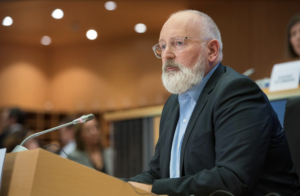
The EU is investing over €1.8 billion in 17 large-scale innovative clean-tech projects with a
third round of awards under the Innovation Fund. Grants will be disbursed from the Innovation Fund to help bring breakthrough technologies to the market in energy-intensive industries, hydrogen, renewable energy, carbon capture and storage infrastructure, and manufacturing of key components for energy storage and renewables. The selected projects are located in Bulgaria, Finland, France, Germany, Iceland, the Netherlands, Norway, Poland and Sweden.
Executive Vice-President Frans Timmermans said: “Today’s grants support innovative businesses across Europe to develop the cutting-edge technologies we need to drive the green transition. The Innovation Fund is an important tool to scale up innovations in renewable hydrogen and other solutions for European industry. Compared to the first disbursement round, the funds available have increased by 60%, enabling us to double the number of projects supported. This is a big boost for the decarbonisation of energy-intensive industry in the European Union.”
The 17 projects were selected under the second call for large-scale projects, meaning they have capital costs above €7.5 million. The projects were evaluated by independent experts based on their ability to reduce greenhouse gas emissions compared to traditional technologies and to innovate beyond the state-of-the-art, while being sufficiently mature for deployment. Other selection criteria included the projects’ potential for scalability and cost effectiveness.
The selected projects cover a wide range of sectors contributing to the EU’s decarbonisation efforts such as production, distribution and use of green hydrogen, waste-to-hydrogen, offshore wind, manufacturing of photovoltaic (PV) modules, battery storage and recycling, carbon capture and storage, sustainable aviation fuels, and advanced biofuels. Together, they have a potential to save 136 million tonnes of CO2eq over their first 10 years of operation.
In addition, up to 20 projects that are promising but not yet sufficiently mature for a grant will be pre-selected for project development assistance by the European Investment Bank. These will be announced in the fourth quarter of 2022.
Projects in brief Energy-intensive industries:
Cement (4 projects): A project in Germany will deploy a second-generation oxyfuel carbon capture process at a cement plant and provide it as raw material for further processing into synthetic methanol. Another one located in Poland will create an end-to-end carbon capture and storage chain starting from CO₂ capture and liquefaction at a cement plant to storage in offshore sites. A third project will capture the CO₂ emissions coming from exhaust gases produced during lime production and store them permanently in offshore geological formations in France. Finally, another project will be the first full-chain carbon capture and storage project in Bulgaria, linking CO₂ capture facilities at a cement plant with offshore permanent storage in a depleted gas field in the Black Sea, through an onshore and offshore pipeline system.
Chemicals (3 projects): In Finland, a project will chemically recycle plastics to be used as a
feedstock for refineries. Another project in Sweden will create a first-of-a-kind methanol plant converting CO₂, residue streams, renewable hydrogen and biogas to methanol. Another project in Finland will produce a new fibre from pulp to substitute polyester in textile applications. Hydrogen (3 projects): In the Netherlands, one project will produce, distribute and use green hydrogen through an electrolyser supplied by offshore wind electricity. Another one will produce 15,500 tonnes of renewable hydrogen per year. The third one will process non-recyclable solid waste streams and transform them primarily into hydrogen.
Refineries (2 projects): In Norway, one project will build and operate the world’s first commercial-scale drop-in biofuel production facility, which will convert forestry waste into advanced second-generation biofuels and biochar. A project in Sweden will build a large-scale facility for the production of synthetic sustainable aviation fuel, using CO₂ captured at a Combined Heat and Power (CHP) plant.
Manufacturing of components for energy storage or renewables production (3 projects): In Poland, a project will create a manufacturing plant of innovative electrochemical battery systems to provide short-term electricity storage. Another project in the North of France will build a manufacturing plant for photovoltaics based on innovative heterojunction technology. A third project in France will construct a Li-Ion recycling plant at the Dunkirk battery cluster for producing and refining black mass, providing access to a secondary source of battery raw material.
Renewable energy: In the German part of the North Sea, a project will construct and operate an offshore windfarm, which will implement innovative solutions for turbines and hydrogen.
Carbon capture and storage infrastructure: A project in Iceland will build a highly scalable onshore carbon mineral storage terminal with an estimated overall storage capacity of 880 million tonnes of CO₂.
EU EXTERNAL BORDERS IN JUNE: WESTERN BALKAN ROUTE MOST ACTIVE
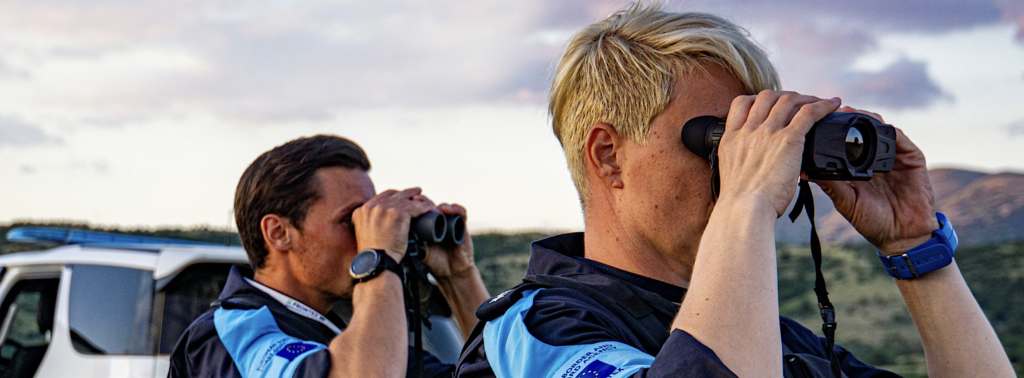
In the first half of 2022, there were about 114 720* irregular entries to the European Union, according to preliminary calculations. This is about 84% more than in the same period last year.
The most significant increase was recorded on the Western Balkan route, where the number of detections increased nearly 3-fold compared with the first six months of 2021. This increase can be attributed to crossing attempts by migrants already present in the Western Balkans.
People fleeing Ukraine and entering the EU through border crossing points are not part of the figures of illegal entries detected. According to the latest Frontex data, 7.2 million people have fled Ukraine into the EU since the start of the war, including 6.3 million Ukrainians.
In June, Frontex registered 23 290 irregular crossings into the EU, 59% more than in the same month of last year.
At the moment, Frontex has more than 2 200 standing corps officers and staff at various sections of the EU external border, as well as in Albania, Serbia, Montenegro and Moldova.
January-June: Top migratory routes
On the Central Mediterranean route, Frontex registered 25 164 irregular border crossings, 23% more than in the first six months of 2021. In June alone, there were 5651 illegal crossings on this route, in line with last year. The main nationalities on this route were Bangladeshis, Egyptians and Tunisians.
On the Eastern land border route, Frontex registered 2452 irregular crossings, 141% more than last year. The main nationalities on this route were nationals of Ukraine, Iraq and Belarus.
The Western Balkan route accounted for half of all the detections with 55 321 illegal crossings, nearly three times the total from the same period of last year. The main nationalities on this route included migrants from Syria, Afghanistan and Turkey.
The number of detections on the Eastern Mediterranean route remains high with 17 957 arrivals (+125%) due to the steady number of arrivals to Cyprus (12 407).
In June, there were 2220 illegal crossings on this route. Most migrants came from Nigeria, Syria and Congo (Kinshasa).
The number of irregular migrants seeking to cross the Channel towards the UK remains high with over 22 400 detections, including attempts and crossings, which represents an 87% increase on the same period in 2021. Migrants continue to make repeated attempts to cross the Channel due to the increase border surveillance along the coastline.
*The figure includes other less active migratory routes not mentioned in this press release. The final figures may be higher due to delayed reporting.
Note: The preliminary data presented in this statement refer to the number of detections of irregular border-crossing at the external borders of the European Union. The same person may attempt to cross the border several times in different locations at the external border.
Source : Frontex
MULTINATIONAL HELICOPTER TRAINING CENTRE TAKES SHAPE AS TECHNICAL ARRANGEMENT IS SIGNED

Another major step was taken towards the establishment of the Multinational Helicopter Training Centre (MHTC) at Sintra Airbase in Portugal when the Technical Arrangement (TA), which defines the organisation, missions and responsibilities of the Centre was signed by 14 founding countries: Austria, Belgium, Cyprus, Czech Republic, Finland, Germany, Greece, Hungary, Italy, the Netherlands, Portugal, Serbia, Slovenia, and Sweden. The signing marks the start of the technical and logistical buildup of the centre which is expected to become a reference for multination military helicopter training.
For an initial period of 15 years, the MHTC will take over the management of EDA’s current three helicopter training programmes: the Helicopter Exercise Programme (HEP), the Helicopter Tactics Course (HTC) programme and the Helicopter Tactics Instructor Course (HTIC) programme, which have been managed by the Agency for almost a decade. Those programmes are not only among the most long-lasting, recognised, and successful ever managed by the Agency, but also highly appreciated and reputed among the rotary wing community.
The MHTC will be built in the same location as the current EDA helicopter training centre, but with a fully renewed infrastructure and permanently manned with a team of 10 international staff, supervised by the MHTC Steering Board. The MHTC is planned to deliver at least 37 weeks of helicopter tactics training per year, including a multinational “Blade” helicopter exercise, a helicopter tactics symposium, and several basic and advance courses with the aim to enhance the tactical knowledge of military helicopter crews, and improve their interoperability levels, facilitating their preparation for international deployments.
Since the launch of the MHTC project in August 2019, EDA has played an active role in coordinating the harmonisation of the different agreements which form the legal, operational, and financial basis of the MHTC and its working processes. From now on, and until the MHTC Initial Operational Capability (IOC) is reached by the end of 2023, EDA will progressively transfer this role to Portugal, as the MHTC host nation, which will take over the activities under the supervision of the MHTC Steering Board, and with the support of EDA.
Among the main upcoming tasks in the process of setting up the MHTC are the buildup of the infrastructure in Sintra and the establishment of a contract with a service provider for the provision of a training simulator and instructor capacities to support the Centre’s activities.
ICAO COUNCIL CONDEMNS BELARUS OVER 2021 RYANAIR FLIGHT BOMB THREAT AND DIVERSION
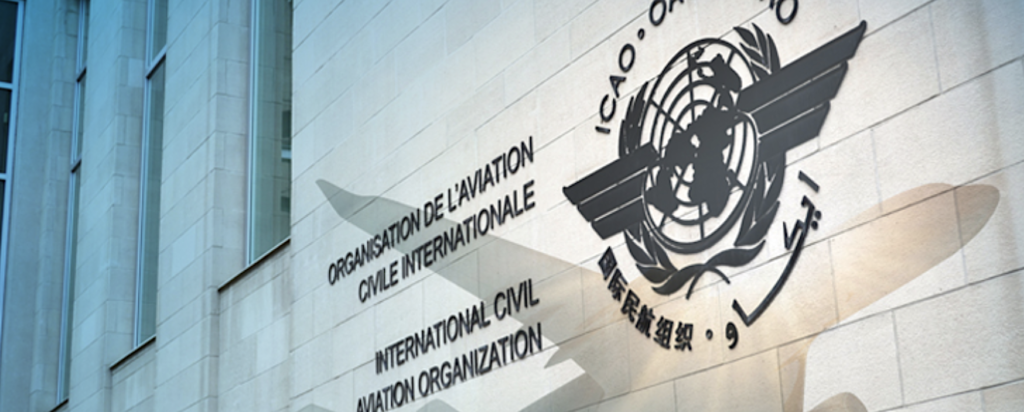
The ICAO Council concluded its discussions on the May 2021 incident in Belarus airspace involving Ryanair Flight FR4978, condemning the actions of the Government of Belarus in committing an act of unlawful interference.
The latest updates to the ICAO fact-finding investigation report into the incident benefited from new information and materials following the Council’s initial consideration of the report in January 2022, as well as an interview and audio recordings from the Minsk air traffic controller assigned to the flight.
Following its consideration of the completed fact-finding results, the ICAO Council acknowledged that the bomb threat against Ryanair Flight FR4978 was deliberately false and endangered its safety, and furthermore that the threat was communicated to the flight crew upon the instructions of senior government officials of Belarus.
The Council Representative for the Russian Federation meanwhile expressed his State’s strong objection to identifying Belarus as the source of the unlawful interference which took place.
The Council expressed appreciation to the ICAO fact finding investigation team for its strenuous efforts and comprehensive analysis and reiterated its condemnation of the communication of false information endangering the safety of an aircraft in flight is an offence under the Convention for the Suppression of Unlawful Acts against the safety of Civil Aviation (Montreal Convention).
The Council also recalled that the use of civil aviation in this manner contravenes the spirit of the Convention on International Civil Aviation (Chicago Convention), in particular its Preamble and Article 4.
In terms of next steps, the Council has directed ICAO to convey the FR4978 report findings to all ICAO Member States, to report the infractions of the Chicago Convention by Belarus to the ICAO Assembly during its upcoming 41st Session (27 Sept. – 7 Oct. 2022), and to post the report for public and media access on the agency’s website.
It further requested the President of the Council to forward the fact-finding investigation report, and the Council’s related decisions thereon, to United Nations Secretary General Antonio Guterres for consideration and any appropriate action.
To read the full report : https://www.icao.int/Security/Documents/Ryanair%20FR4978%20FFIT%20report.pdf
RUSSIA SHOULD BE SUSPENDED FROM INTERPOL, SAY MEPS
Members of the European Parliament (MEPs) approved a Recommendation to strengthen INTERPOL’s ability to stop authoritarian regimes abusing its tools. The Recommendation, which sets out the Parliament’s positions on the EU’s cooperation agreement with INTERPOL, received overwhelming support from MEPs with 607 voting in favour.
MEPs would like to see the agreement grant relevant EU agencies – Europol (the EU Agency for Law Enforcement Cooperation), EPPO (the European Public Prosecutor’s Office), Eurojust (the EU Agency for Criminal Justice Cooperation) and Frontex (the European Border and Coast Guard Agency) – access to Interpol’s databases.
As part of the agreement, MEPs ask for guarantees that European data protection rules are respected when transferring data between the EU and Interpol. The new agreement should clearly spell out the purposes for which data can be transferred and block the retention of data for longer than what is necessary for these purposes. Also, it should ensure that personal data cannot be transferred if it would be used in connection with death penalties or inhumane treatment. In the event of a data breach, MEPs would like to see clear procedures and minimum transparency requirements.
Concern over red notices
MEPs note that Interpol’s Red Notices, which are requests to arrest a person in another country, have been used in politically-motivated ways, and Interpol’s current processing of Red Notices is not transparent enough. To improve this, MEPs would like to see annual publishing of data on these notices broken down by country. The data could then be used to create risk profiles for abusive notices and their diffusion. As authoritarian regimes may try to abuse the Interpol tools, the Commission should establish an EU verification mechanism to exchange information about abusive notices and remove them where necessary, argue the MEPs.
Questions over the role of Russia
MEPs note that Russia’s invasion of Ukraine is a direct threat to international law enforcement cooperation, and Russia’s continued access to Interpol data is endangering EU cooperation with the police organisation. Therefore, MEPs support removing access rights to Interpol data from Russia and Belarus, and eventually suspend them from Interpol altogether. Russia is a major issuer of Red Notices, and the European Parliament has previously condemned its use of arrest warrants to pursue Lithuanian judges in connection with the country’s independence from the Soviet Union.
Background
Currently, only EU member states have access to Interpol’s 19 databases, whereas EU agencies have no way of exchanging this information. In July 2021, the Council authorised negotiations for a new co-operation agreement between the EU and Interpol.

After the vote, rapporteur Jadwiga WIŚNIEWSKA (ECR, PL) said: “Interpol is the EU’s key partner in countering terrorism and fighting organised crime. However, EU-Interpol collaboration could be further tightened and formalised. My report establishes guidelines for negotiations on a co-operation agreement, and our key priorities are granting EU agencies direct controlled access to Interpol’s databases and tackling the misuse of Interpol’s red notices and arrest warrants. Also, given the geopolitical situation, I believe strongly that Russia should be excluded from Interpol following its unjustified aggression towards Ukraine.” “The most important recommendation is to exclude Russia from Interpol and its databases. There is evidence of clear and repeated violations of international law by Russia, including the most terrible war crimes committed against Ukrainian civilians. There is no other way than to exclude the Russian Federation from this organisation as the country has lost its international credibility and the relationship of trust that is necessary for international cooperation has been completely destroyed.”
EUROPEAN MEDICAL COMMAND PROJECT NOW OPERATIONAL
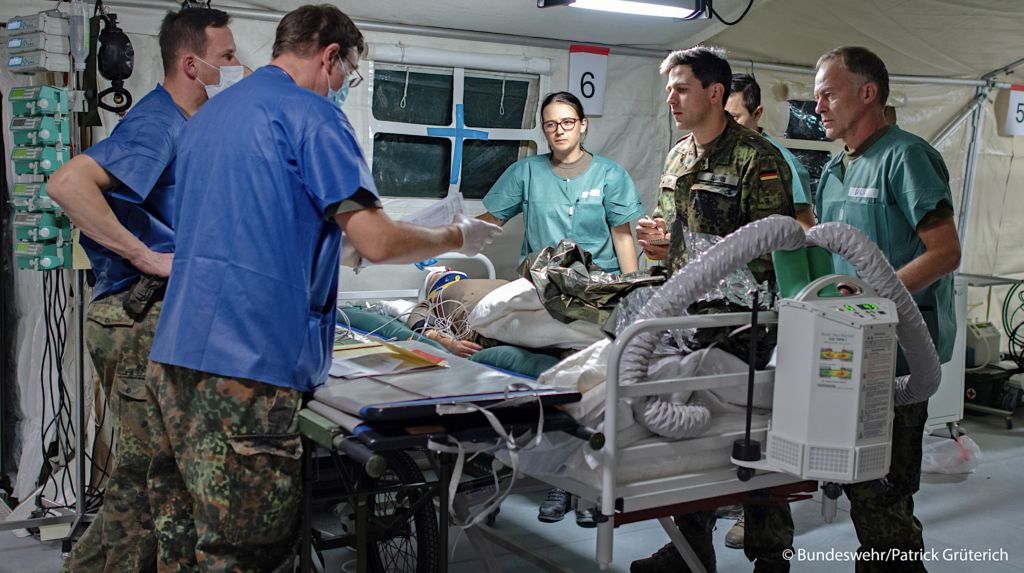
The European Medical Command, a Germany-led PESCO project launched in March 2018, has reached Full Operational Capability (FOC). Supported by 18 countries, it will benefit the EU and NATO with an enduring medical capability to increase medical operational readiness and interoperability for future joint and combined operations.
Since one of the project’s key ambitions was to promote closer EU-NATO medical cooperation, the 18 participating countries agreed to merge the European Medical Command (EMC) with NATO Framework Nations Concept’s Multinational Medical Coordination Centre (MMCC) to build up a model for effective use of resources through national efforts and multinational cooperation in one entity. The common structure created from these two initial projects – for both of which Germany is the ‘framework nation’ – is now called Multinational Medical Coordination Centre/European Medical Command, or MMCC/EMC, operating under one single administrative and infrastructural framework.
From now on, the MMCC/EMC is available for its members, the EU and NATO acting as a medical support coordination and linking body for Baseline Activities and Current Operations (BACO) and Common Security and Defence Policy (CSDP) operations and missions. As an innovative and project-driven interface, the medical projects implemented by the MMCC/EMC will focus on producing direct benefits for its participating nations, NATO and the EU. One of the main goals is to strengthen NATO’s and the EU’s medical services by increasing interoperability of medical material and standards.
The two-rooted entity is tasked by its participating nations, the EU or NATO and has a bridging function between NATO, EU and international medical stakeholders by acting as a network facilitator and connector. Currently, the MMCC/EMC is acting as a link between civilian and military services of the EU and NATO in supporting the evacuation of wounded and sick people from Ukraine. This lighthouse project is intended to improve cooperation between NATO and EU medical capabilities and services.

